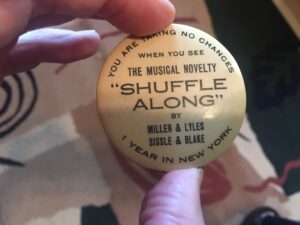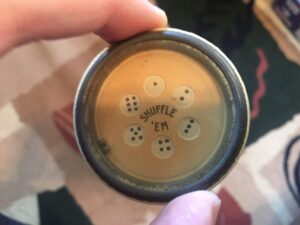YOUR DAILY DOSE OF EUBIE!!!!
May 23, 2021 will mark the 100th anniversary of the opening of Shuffle Along on Broadway, the groundbreaking musical scored by Noble Sissle and Eubie Blake. We’re celebrating here at the Eubie Blog all this spring with a special emphasis on the show, newly found material, and we hope soon to be created exciting podcasts.

It was natural for the show’s creators to celebrate the unique achievement of staging a musical written by, staged, choreographed, produced, and acted by an all-Black cast. To celebrate the first year anniversary of its New York run, this small pocket charm was issued noting that “You are taking no chances” by booking a ticket for the show. Also on the anniversary of the show’s year on Broadway, members of the touring company, then playing Brooklyn, joined the cast at the 63rd Street Theatre for a gala midnight performance. There were 140 performers on the stage and the reaction was tumultuous.
The Broadway production of Shuffle Along closed on July 15, 1922 after 504 performances. At the time of its closing Shuffle Along could boast it had the eleventh longest run of any Broadway musical up to that time including Show Boat, which ran 572 performances. And the show had two numbers in the top 50 songs of the year, “Bandana Days” and “I’m Just Wild About Harry.” Shuffle Along’s achievement in New York made it among the top ten longest-running and most successful shows of any Broadway production—and the only one steered by African-Americans—of the ‘20s.

“shuffle” a hand of cards using two steel balls.
While not the only reason for the emergence of the Harlem Renaissance, Shuffle Along certainly contributed to the remarkable blossoming of black entertainment’s inroads to popular song and theatre. In 1923, the Cotton Club opened its doors. Though it catered to white audiences and its songs were written by the likes of white songwriters Harold Arlen and Ted Koehler and the team of Jimmy McHugh and Dorothy Fields, the casts were all black and featured such future stars as Lena Horne. The Shuffle Inn opened on 1921 and soon had its name changed to Connie’s Inn. That nightspot sported black songwriters Thomas “Fats” Waller and Andy Razaf in a series of all black revues including Hot Chocolates and Keep Shufflin’. Razaf would soon become one of Blake’s major collaborators. And Small’s Paradise at 229 ¼ Seventh Avenue mainly hosted white audiences but blacks were also welcomed. There were other venues around Harlem particularly on “Jungle Alley,” 133rd Street between Lenox and Seventh avenues. And it was Shuffle Along that helped jumpstart it all, making black entertainers safe for white audiences and giving a leg up to hundreds of African-American singers, dancers, choreographers, writers, and songwriters.
The closing of Shuffle Along on Broadway was just the beginning for Sissle and Blake as the show hit the road, spreading the popularity of this innovative show. The show’s success would have a deep impact on Blake personally and professionally, putting strains on his marriage and his partnership with Sissle. Although the show should have opened doors for its creators, it still was not easy for African-Americans to succeed in the cutthroat entertainment world—as Sissle and Blake would quickly discover.
A touring company took the original cast to major cities including Boston, Chicago, and St. Louis, where it ran successfully for sold-out engagements. A second “B” company toured more extensively, even venturing into the Deep South, returning for a second engagement to many theaters it played in its first year of travel. You can track the show’s tours here on our website: http://www.eubieblake.net/exhibits/show/shuffle-along–tours-1921-1923